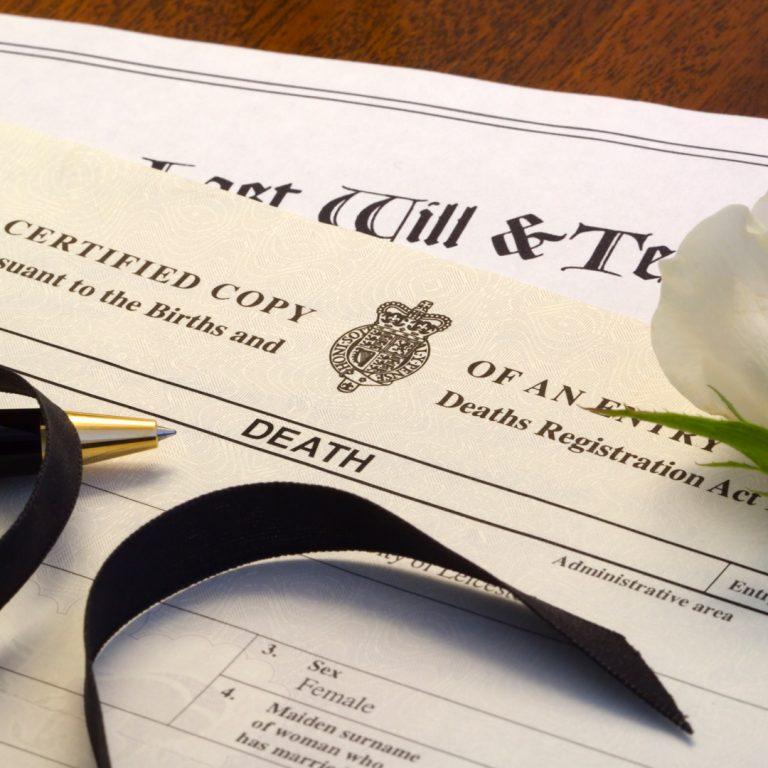When a spouse dies, it’s difficult for a partner to think about anything but the loss; unfortunately, there are pressing financial concerns that death creates. To help, this guide explains what steps surviving spouses can take to protect their finances, and their loved one’s legacy.
1. Gather key helpers and documents.
A small group of trusted family members or close friends can help the surviving spouse with necessary financial tasks, especially right after the death. A point person keeping track of delegated tasks will make life easier for the bereaved partner and ensure nothing falls through the cracks.
Respected professionals can also help, such as an attorney to handle the deceased’s will and settle their estate in probate court. If the couple previously worked with a tax professional, financial advisor or insurance agent, these contacts can provide additional support and valuable information, which may include access to some of the documents needed at this time like:
- The deceased’s will, birth certificate, social security card and military service records
- Life, health, auto and homeowners insurance policies
- Joint or individual tax returns, non-retirement and retirement financial account statements, mortgage and other loan statements, and lease documents
- Marriage certificate
- Real estate property deeds and personal property titles
- Safe deposit box location and key
- Ownership information for businesses in which the deceased had an interest
2. Request death certificates.
To take care of many of the financial tasks after a spouse’s death, the surviving partner will need to provide a copy of the death certificate in order to get assistance from the deceased’s employer, the Social Security Administration, a life insurance provider, financial institutions and others. The easiest way to get the original death certificate and copies of it is through the funeral home. Otherwise, contact the county clerk’s office. Twelve to 15 copies suffice in most cases.
3. Contact the spouse’s employer.
Speak to someone in human resources (HR) and find out what else besides a copy of the death certificate is required to receive any accrued salary, vacation pay or sick leave owed to the deceased. Other things to ask:
- How to file a claim for an employment-based insurance policy?
- What are the options for continuing health insurance coverage through COBRA?
- What do pension and employer-sponsored retirement account beneficiaries need do to next?
If the deceased has pensions or employer-sponsored retirement accounts with previous employers, also contact those HR departments.
4. Initiate life insurance claims.
It’s fairly common for people to have life insurance beyond what their employer offers. For these policies, contact your insurance agent or the issuing insurance company to notify them of the death and find out how to file a claim as a beneficiary.
5. Begin requesting eligible benefits.
The surviving spouse may be eligible to receive benefits from the following sources. Notify those that apply and find out the process for initiating a claim for benefits:
- Social Security Administration (1-800-772-1213)
- Veterans Affairs for those who served in the military (1-800-698-2411)
- The deceased’s union
When calling about social security, ask about eligibility for death and survivor benefits.
6. Notify all financial institutions and insurance providers.
Any bank, credit union or investment company with whom the deceased had an individual or joint checking, savings, term or brokerage account needs to be notified. Especially for joint checking and savings accounts, ask if they have automatic rights of survivorship, which means the surviving spouse can access the account without disruption.
Additionally, contact your insurance agent or any insurance companies with whom the deceased had a homeowners and auto policy either individually or with a spouse to find out next steps for cancelling or retaining such policies.
7. Address bills and creditors.
Monthly household bills for things like a mortgage, home equity line of credit and joint credit cards still need to be paid. Likewise for utilities and jointly used streaming or subscription services. If the deceased’s name is on the account, update this by notifying the lender or provider.
If the deceased has any loans or credit cards solely in their name, notify those creditors too. Then discuss how any outstanding balances on these will be paid with the attorney handling the estate. Finally, cancel any memberships or services that the surviving spouse doesn’t use or want anymore.
8. Finalize health insurance claims.
Request that any final medical bills from healthcare providers who treated the deceased be processed through their health insurance provider as quickly as possible. This will help determine the patient’s portion of these bills, which are typically paid out of the deceased’s estate.
9. Write to the credit bureaus.
Upon the spouse’s death, sending a letter to each of the major credit bureaus ensures the deceased’s credit report reflects their death. In this correspondence, include the deceased’s full legal name, social security number, date of birth and death along with a copy of the death certificate. This notification helps keep anyone from stealing your loved one’s identity and wracking up debt in their name.
- Equifax: PO Box 105139, Atlanta, GA 30348-5139
- Experian: PO Box 4500, Allen, TX 75013
- Transunion: PO Box 2000, Chester, PA 19016
You can also request a copy of the deceased’s most recent credit report to ensure you have a current list of all their creditors.
10. Contact the DMV.
Another important step to protect your loved one’s identity from being stolen after their death: Notifying your state’s Department of Motor Vehicles (DMV), which issues licenses and other forms of identification.
11 – 15. Additional Financial Steps
- Create a new budget: This new budget should take into account the loss of the spouse’s income, the addition of social security, VA and/or union benefits, and changes to financial goals.
- Close or adjust spouse’s social media accounts. Whether deactivating them or using them as memorials for the deceased, this step also helps prevent identity theft.
- Contact the financial aid office for kids in college. The loss of one parent may qualify the student for more financial assistance.
- Update beneficiaries. For the surviving spouse’s estate planning, the beneficiaries designated in their will, on pensions and for any other financial accounts should be updated.
- File spouse’s final tax return. A tax professional can ensure this is completed according to IRS rules.
There may be additional financial tasks to tackle depending on particular situations, but completing the above steps will ease the way for surviving spouses.






Comments Section
Please note: Comments are not monitored for member servicing inquiries and will not be published. If you have a question or comment about a Quorum product or account, please visit quorumfcu.org to submit a query with our Member Service Team. Thank you.